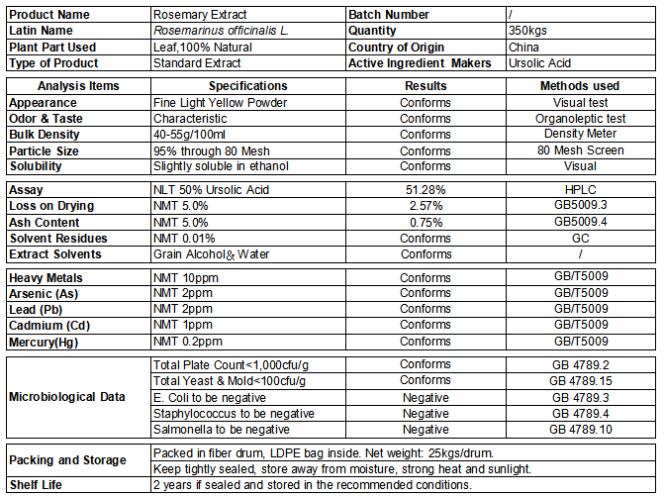T: +86-731-89865681
E: info@kingherbs.com
E: info@kingherbs.com
27Fl, Blding A, Cimen Fun City, Wanjiali Road, Changsha 410014, Hunan, China
| Availability: | |
|---|---|
| Quantity: | |
Description
Rosemary, the Latin scientific name (Rosmarinus officinalis), is a dicotyledonous plant, Lamiaceae, rosemary shrub. It is native to Europe and the Mediterranean coast in northern Africa, China has introduced in the ancient time (the period of Cao Wei) . Now mainly planted in the south, east of China, like Hunan province, Guangxi province, Henan province.
Rosemary Extract have contain rosemary essential oil, rosmarinic acid, carnosic acid, carnosol and ursolic acid. The antioxidant capacity of rosemary extracts is based on their content of phenolic diterpenes which are fat soluble, notably carnosic acid and carnosol.These diterpines can be further oxidized on exposure to elevated temperatures, however their capability to prevent oxidation is maintained. Rosemary also liberates a water soluble extract, rosmarinic acid can be used as water-soluble antioxidant in food and other industries.
Function:
1. Antioxidant;
2. Decolorized & deodorized;
3. Anti-aging;
4. Treatment of cardiovascular disease;
5. Protect color;
6. Stable flavor;
Application:
1. Cosmetics;
2. Food additive;
3. Pet Food
4. Beverage


Rosemary (Rosmarinus officinalis L.) is a fragrant evergreen shrub with needle-like leaves and blue flowers. It is native to the Mediterranean region, but it is now grown all over the world. Rosemary has a long history of culinary and medicinal use.
Health benefits of rosemary:
Improved cognitive function: Rosemary has been shown to improve memory, attention, and focus.
Reduced stress and anxiety: Rosemary may help reduce stress and anxiety levels.
Boosted mood: Rosemary may help improve mood and reduce symptoms of depression.
Enhanced circulation: Rosemary may help improve circulation and reduce the risk of blood clots.
Lowered blood sugar levels: Rosemary may help lower blood sugar levels in people with type 2 diabetes.
Reduced inflammation: Rosemary has anti-inflammatory properties that may help reduce inflammation throughout the body.
Improved digestion: Rosemary may help improve digestion and reduce symptoms of indigestion.
Boosted immunity: Rosemary may help boost the immune system and protect against illness.
Antioxidant protection: Rosemary is a good source of antioxidants, which can help protect the body from damage caused by free radicals.
Antimicrobial properties: Rosemary has antimicrobial properties that may help fight bacteria and viruses.
Rosemary can be used in a variety of ways, including:
Culinary: Rosemary is a popular herb used in cooking. It can be added to soups, stews, sauces, marinades, and dressings.
Medicinal: Rosemary can be used to make teas, tinctures, and extracts. It can also be applied topically to the skin.
Aromatherapy: Rosemary essential oil can be used in aromatherapy to promote relaxation and reduce stress.
Rosemary is generally considered safe to use, but it is important to follow the recommended dosage instructions. Some people may experience skin irritation from topical use of rosemary.
Description
Rosemary, the Latin scientific name (Rosmarinus officinalis), is a dicotyledonous plant, Lamiaceae, rosemary shrub. It is native to Europe and the Mediterranean coast in northern Africa, China has introduced in the ancient time (the period of Cao Wei) . Now mainly planted in the south, east of China, like Hunan province, Guangxi province, Henan province.
Rosemary Extract have contain rosemary essential oil, rosmarinic acid, carnosic acid, carnosol and ursolic acid. The antioxidant capacity of rosemary extracts is based on their content of phenolic diterpenes which are fat soluble, notably carnosic acid and carnosol.These diterpines can be further oxidized on exposure to elevated temperatures, however their capability to prevent oxidation is maintained. Rosemary also liberates a water soluble extract, rosmarinic acid can be used as water-soluble antioxidant in food and other industries.
Function:
1. Antioxidant;
2. Decolorized & deodorized;
3. Anti-aging;
4. Treatment of cardiovascular disease;
5. Protect color;
6. Stable flavor;
Application:
1. Cosmetics;
2. Food additive;
3. Pet Food
4. Beverage


Rosemary (Rosmarinus officinalis L.) is a fragrant evergreen shrub with needle-like leaves and blue flowers. It is native to the Mediterranean region, but it is now grown all over the world. Rosemary has a long history of culinary and medicinal use.
Health benefits of rosemary:
Improved cognitive function: Rosemary has been shown to improve memory, attention, and focus.
Reduced stress and anxiety: Rosemary may help reduce stress and anxiety levels.
Boosted mood: Rosemary may help improve mood and reduce symptoms of depression.
Enhanced circulation: Rosemary may help improve circulation and reduce the risk of blood clots.
Lowered blood sugar levels: Rosemary may help lower blood sugar levels in people with type 2 diabetes.
Reduced inflammation: Rosemary has anti-inflammatory properties that may help reduce inflammation throughout the body.
Improved digestion: Rosemary may help improve digestion and reduce symptoms of indigestion.
Boosted immunity: Rosemary may help boost the immune system and protect against illness.
Antioxidant protection: Rosemary is a good source of antioxidants, which can help protect the body from damage caused by free radicals.
Antimicrobial properties: Rosemary has antimicrobial properties that may help fight bacteria and viruses.
Rosemary can be used in a variety of ways, including:
Culinary: Rosemary is a popular herb used in cooking. It can be added to soups, stews, sauces, marinades, and dressings.
Medicinal: Rosemary can be used to make teas, tinctures, and extracts. It can also be applied topically to the skin.
Aromatherapy: Rosemary essential oil can be used in aromatherapy to promote relaxation and reduce stress.
Rosemary is generally considered safe to use, but it is important to follow the recommended dosage instructions. Some people may experience skin irritation from topical use of rosemary.